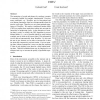Free Online Productivity Tools
i2Speak
i2Symbol
i2OCR
iTex2Img
iWeb2Print
iWeb2Shot
i2Type
iPdf2Split
iPdf2Merge
i2Bopomofo
i2Arabic
i2Style
i2Image
i2PDF
iLatex2Rtf
Sci2ools
104
click to vote
SDM
2009
SIAM
2009
SIAM
Exploiting Semantic Constraints for Estimating Supersenses with CRFs.
The annotation of words and phrases by ontology concepts is extremely helpful for semantic interpretation. However many ontologies, e.g. WordNet, are too fine-grained and even human annotators often have disagreements about the precise word sense. Therefore we use coarse-grained supersenses of WordNet. We employ conditional random fields (CRFs) to predict these supersenses taking into account the interaction of neigboring words. As the annotation of training data is costly we modify the CRF algorithm to process lumped labels, i.e. a set of possible labels for each training example, one of which is the correct label. This information can be derived automatically from WordNet. By this and the use of new features we are able to increase the f-value for about 8% compared to previous results. If we use training data without annotations it turns out that the resulting F-value is only slightly lower than for a fully labeled training data. Therefore unlabeled data may be employed in an unsu...
| Added | 07 Mar 2010 |
| Updated | 07 Mar 2010 |
| Type | Conference |
| Year | 2009 |
| Where | SDM |
| Authors | Gerhard Paaß, Frank Reichartz |
Comments (0)

